|
As a child, barely a teenager, back when I read my first fantasy novel, The Sword of Shannara, I saw (and still do) see expansive potential in the fantasy genre. I had a plethora of fantastic ideas floating around in my head, and here, in this wonderful book I was reading, I saw a way to get those ideas out. I loved to draw, but it wasn't something I was passionate about, and saying my ideas out loud oftentimes came out jumbled and directionless. But writing, finally, gave me a way to get my ideas and stories to coalesce into something tangible and fantastic. I immediately began to write down my ideas, folding and organizing them into sentences, paragraphs, and chapters. I planned out my book, then another and another. I researched what it would mean to be a writer, how to hone my craft and edit my work. I learned what it meant to be a plotter rather than a pantser. I looked hard at what it would mean to become an author and how to get signed with a publisher. I knew going in it wouldn't be easy, and that finding an agent or a publisher would be a long and difficult task. I was up for the challenge. It took years and years of work to finally get my manuscript to a point where I was comfortable sending it out to publishers. So much time had passed in fact that the publishing industry was already beginning to evolve from what I'd learned growing up about what to expect. In the mid 2000's, slush piles weren't really a thing any more. Agents got your material to one of the Big 5 Publishers these days. I kept my head up and I followed the road I'd been following for years. If an agent is what it would take to get my book published, then that's where I'm going. I submitted my book to countless agents over the course of two years. I didn't get a single nibble, and I saw plenty of rejection. The biggest criticism I found was that my novel, even as a fantasy novel, at a whopping 300,000 words, was too large for a new author. But how could that be, I wondered? All the great fantasy novels I read as a kid were 200K plus words! Despite my reservations, I decided to break my manuscript up into more manageable books. After all, the road kept going ahead, and I had to adapt to the conditions. After a couple more years of editing and submitting to agents and publishers, I finally signed with Wild Child Publishing in January of 2011. I had a lot of reservations going in, mainly because Wild Child was an eBook publisher, not a traditional print publisher. Print was possible, but only if I sold a certain amount of books, and guess what, I would be a book seller. Marketing was required as a part of my contract. Wild Child helped some to sell my book, but a large amount of the marketing and selling was my responsibility. Again, this wasn't the road I was expecting, but it was the journey I signed up for and I wanted to see it through. My experience with Wild Child wasn't terrible, but it wasn't what I'd always dreamed of. There were parts of this journey that really meant something to me though. The marketing aspect rekindled my love for graphic design, which I think really helped the process. I also met Shawn Howen, my editor, who helped make me into a better writer and shape my book into what it is today. 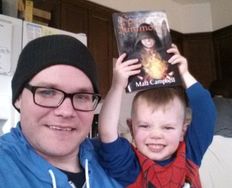 In December of 2013, my first book, Spirit Summoner, was released by Wild Child Publishing. By February 2014, enough eBook versions of my book had sold for my publisher to release it in print. I was ecstatic. Finally, my book was in paperback, and I got to hold it in my hands! Furthermore, my publisher was so happy with my performance, she agreed to release my next book in print and eBook at the same time. The road wound on, but the life of bookseller, marketer, author, and writer began to wear on me. The change happened gradually. The marketing and blog posts got monotonous and much less exciting to create and keep up on. Besides, it took a lot of time to put together! Editing, a very important aspect to the author life, was wearing me down also. I missed the writing, the actual creation process, but I found it very difficult to make the time to do this between everything else I was working on. 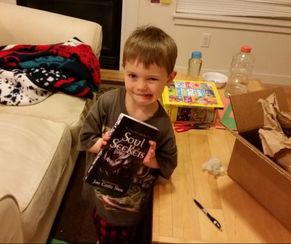 .Shortly after my second book, Soul Seekers, was released in late 2015, I got an email from my publisher stating Wild Child Publisher was closing. I understood the decision, but I felt defeated, especially since I'd worked so hard and made so many compromises. Now I wouldn't get to publish the last book in my series. My editor, Shawn, had my back, and encouraged me not to give up. She even offered to edit the final book in my series, which we're currently working through. I kept on the road I'd started all those years back, and I self-published Spirit Summoner and Soul Seekers through Amazon.com both in Kindle and paperback. I ran the same marketing game I ran with Wild Child, and that seemed to serve me well for a while. Eventually though, it sort of just fizzled out. I wasn't happy posting to Twitter, Facebook, and Instagram several days a week. I wasn't happy making up content. I wanted to write, but I wanted to stay on the road, too, and I didn't have time to do both.
I came to a decision after lots of deliberation. Once I published Devoid, the final book in my series, the road I'd started as a child was going to come to an end. It wasn't an easy decision. It actually sort of shattered my world for a while. But as I looked back at the journey I'd been on, it just wasn't the journey I'd always dreamed of. It was filled with all sorts of road blocks and detours and hazards that just weren't a part of what I'd dreamed. I'm glad I went on the journey, and I'm proud of the work I've accomplished. Regardless, the road called "Being a Published Author" is coming to an end. But even though I might be hitting the end of this road, the journey will continue. There are other roads to travel, roads more to my liking, and hopefully, roads filled with excitement, beauty, and challenges all their own. I doubt this will be the end of the Chosen of the Light either, but these stories might just be stories and nothing more. No publishing contracts or marketing schedules or Hollywood blockbuster movie deals. But I'm okay with that.
1 Comment
Years ago, I started writing a book. When I say years, I really mean decades. This book, a fantasy novel, told the story of Darr Reintol and his many, many friends as they sought out the Chosen of the Light. Like many of the books I’d been reading at the time, this was to be an epic fantasy. In true epic fashion, my story spanned thousands of years in a world rich with a culture and history of its own, with many different characters, each with their own individual stories. At the time, I believed I’d written a truly engaging book, something that any reader of epic fantasy would love.
The world of publishing did not agree. Rejection after rejection made me try another angle by seeking an agent, and again, I could find no purchase. I divided up my novel, creating three books, and after another year of submission, I finally landed a publisher and an editor. It was only then that I found what may have been the fatal flaw in my writing. Story. Story is the truth behind all that my writing does, for it is the storytelling that so fascinates me. Since before I could write, I loved telling stories, creating new worlds and things and people with my imagination. But story is what lacked in my novel as well, for in trying to pack in everything epic, I lost my narrative. When my editor, Shawn Howen, first told me how much I needed to cut from my first book, I was distraught. I insisted I needed every bit of information, every bit of history, and every odd perspective in order to make the story work. Shawn disagreed. Fortunately, she saw the story laying beneath the scattered histories and perspectives. She knew I was writing about Darr, which is very true, but I was also writing about the world of Ictar, too. What does the history of the Ancients have anything to do with how Darr feels and what actions he takes? When I tell the story from the point of view of some distant character not even connected to Darr, am I furthering Darr’s story or my own? If I view my story with Darr as linear, any time I drop into a rambling about my world’s history or another point-of-view, I’m creating a stress point in my line. With too many stress points, my line, and my story, crumbles. I suffered, but I recovered. Like the true storyteller I aspire to be, I refocused my thoughts and edited my book accordingly. I told my story about Darr. In the end, I’ve become a much better writer and storyteller, but all of these memories of revising is coming back to me because it’s happening again. Currently, I’m working on the third and final book in my series, but the story I always believed was there just isn’t there. It has become the story that never was, because I have changed as a writer, leaving me with parts that no longer fit. The solution is figuring out where the real story is, and for me, that will be a point of some frustration, but also fun. I haven’t had the chance to create new material in this book for a long time. In find the story that never was, I’m tasked with finding the story that will be. Growing up, I was involved pretty heavily with my church, and while that part of my life has passed, many of those experiences (as all experiences do) shaped me into the person I am today. So, it’s no surprise that those experiences helped shape my writing and the worlds I create. When I was in middle school, I had the amazing opportunity to travel to Jamaica on a mission trip. This was my first trip out of the country (sorry, Canada doesn’t count), and it was the farthest I’d ever flown on an airplane. Did I mention I was traveling to a third world country, one I knew next to nothing about? I was anxious, excited, and completely unsure of what to expect. So, when I met Martin, it’s no surprise that he would turn into the basis of one of my most important characters. Martin was one of the missionaries residing in Jamaica. He helped shuttle us around, introduced us to the people, and taught us about the culture and the land. I remember him being tall and intimidating, but he was charismatic in his own way. He had wide features and a deep voice, and I couldn’t help but listen to him any time he had something to say. I felt like I’d be missing something if I didn’t.
When I really got serious about The Chosen of the Light, I began rewriting and fleshing out my characters, turning them into real people. Most of my characters had always been real in my mind, so fleshing them out wasn’t too much of a problem, but there was one that I couldn’t get a grasp on. Nidic Waq, the prophet featured throughout my series, and arguably one of the most important characters. Spirit Summoner might be about Darr, but Darr is driven and guided by Nidic Waq. My problem with Nidic Waq was I didn’t have a good handle on him. He was a wizard-type character in my mind, but that’s all I really had on him. Besides, he wasn’t a wizard, he was a prophet and a Spirit Summoner. He didn’t have any human characteristics, and I knew that had to change. No one in my life really seemed to embody the characteristics I imagined he should have, and so I had a difficult time trying to make him into a “real person”. Martin, the missionary from Jamaica, finally helped me figure it out. Martin with his intimidating presence nonetheless drew me in and made me want to listen to whatever he had to say. He was the perfect basis for Nidic Waq. Of course, I gave my character my own little tweaks, making him exactly what I envisioned, but if it wasn’t for meeting Martin, I don’t know that he’d be the same character he is today. I found out a couple years later that Martin had left his position as a missionary, turning away from friends and family, but that never discouraged me. If anything, it made me realize Martin, like Nidic Waq, was human, and prone to dreams and desires. I looked at Nidic Waq in an entirely new way, as a human who’d made certain decisions that led him in a certain direction. Maybe one day, his choices will take him down a different path. Science is the lifeblood flowing through every science fiction novel. You can’t have good sci-fi without a solid foundation of science in which to build. The fantasy genre is much the same, except in place of science, a much more fluid foundation exists, namely magic. Whereas science in sci-fi draws from real world techniques and practices, magic draws from the author’s imagination. However, just because magic performs differently than science, this doesn’t mean magic can act all willy-nilly. In fact, when magic acts outside a solid system of rules, it breaks the suspension in its believability within its fantasy world.
What Is Magic? Magic functions differently throughout the many fantasy worlds. It may be a rumor, or it may be a reality, possessed by only a handful or by many. The power of magic takes many shapes and forms, ranging from simple abilities that augment a person’s senses to god-like abilities of creation and destruction. What sets apart a good magic system from a bad one is the time and thought that goes into it. Because magic takes the place of science in fantasy, and because it cannot act any way it wants, an author must define the boundaries within which their magic works, and they must write within those boundaries. Developing a Magic System Figuring out how a magic system works is an exercise in imagination. Keeping track of it can be an exercise in futility, which is why making sure you have notes is important. Normally, I can go either way on note taking in writing (although I am a known plotter), but where magic systems are concerned, I firmly believe a good one must be written down rather than remembered. Unless you’re Sheldon Cooper, you aren’t going to remember all the details about your magic system. Here are some things to consider:
Evolution Time changes everything, and just like science, the power of magic can change in time. Be aware of this when developing a magic system. If a magic system draws power from belief in its use, where will it be in a hundred years? If magic can only be used by a certain race then what happens to half-breeds? These are all things to consider even if you have no plans to expand into the future of your fantasy world. Knowing where magic comes from and where it’s going is all part of a magic system. It enables the creator to understand the system on a deeper level, which in turn adds depth to the fantasy world. All Imagination Creating and maintaining a magic system all comes down to imagination, and pushing the limits of imagination. Magic should be fluid and exciting. It should take a basic idea and push it into the fantastic. Don’t let magic control the direction of a story. It should work within the story. Therein lies real magic. Like Hansel and Gretel leaving a trail of breadcrumbs through the forest, I leave little markers for myself as I edit. They're not as tasty as breadcrumbs, but they serve their purpose. They help me find my way back to whatever story I was originally trying to tell.
While editing Book Two (and now Book Three) of The Chosen of the Light, I've been finding it difficult to keep the story focused and moving. I'm using the techniques I learned from while editing Spirit Summoner, but I'm throwing in a trick of my own: Breadcrumbs. This idea won't work for everyone. Maybe it only works for me. But I thought I'd share it anyway. If anything it'll give you some insight into my own writing process. That being said, I'm a planner when it comes to my writing. I like to know the story heading into it. I spend a good while sorting out many of the details in my head before I ever begin writing. I've tried to just let the story take me where it will, but the effects are often a disaster of plotholes. Now, I don't need every detail or even every character, but I must know the general direction of the story. You might be asking what this has to do with editing and here's what I've found. Even the best planner cannot always stick exactly to the plan. Writing is fluid, as if storytelling. Sometimes, when you finally get to your planned ending, little changes along the way have changed the overall story. When I begin editing, the first thing I do is run through the story, chapter by chapter. I give each chapter a quick perusal, then at the top of the page, I leave a comment indicating the POV and a light synopsis for what's happening. I can easily scan between chapters, giving myself a clear picture of the direction things need to take, and at the end of the book, I can tell what needs to be done to maintain the story. The breadcrumbs remain in place until the very end, right before I send off to my editor. You never know when you're going to find yourself lost in the woods of your own writing. 
Storytelling is a wonderful thing. Telling stories allows us to share feelings of love or sadness. We can share thoughts or memories, impart knowledge, or weave incredible fantasies. Figuring out how far you'll bring your audience into your story depends on a number of things, beginning with your point of view.
Are you telling this story as an omniscient narrator, giving your audience details about everyone and everything? Or are you telling this from a limited perspective, giving your audience details specific to one character?
MISSION OBJECTIVE
When beginning to write a story, I find it helpful to ask the question "What is my mission objective?" Am I looking to enlighten or entertain? Do I simply need to get a story out of my head? Is there a character itching to get out? Figuring out my mission objective is helpful in figuring out my POV, but it doesn't always get me going in the right direction. Case in point: I've been bouncing around a story for a couple of years now, a story about a young man with a peculiar superpower. When I first sat down to write this story, I did so because I had a character (and more specifically, his power) to write about, so I wrote from the first-person narrative. EX: Still, I didn't cry. I watched the gunman, my eyes burning with hatred. I wanted to make this man suffer. But I knew I had to wait. I had to be strong. My opportunity would come.
Something was always missing from this story, and I couldn't put my finger on it. I ran it through a local writing group I was working with a couple years ago, and one of the suggestions was to change to POV. Whoa. What? Change my mission objective? NEVER! But the more I thought about it, the more I began to realize what changing perspectives could do to this story. A lot of the critiques centered around the character and how limited of a character he was. In order to see his real depth, maybe I'd have to look at him from someone else's point of view.
THE LONG HAUL
As you can see, figuring out my mission objective is helpful, but not a definitive answer. My choice of POV was put to the test again when I began editing Spirit Summoner. My mission objective in writing The Chosen of the Light was to entertain and to give someone else the same spark of imagination that I'd been given so long ago. I also had another objective, one I don't share that often: I was writing it for me because this was my world, and this would be my way of making it real. What I wrote was an entire chunk of Ictarian history, retold from many different points-of-view. To me, every single word was necessary to tell the story, but my editor showed me a different side. Every time I shifted POVs, I detracted from the story. As my reader tried to figure out who's head they were in this time, they lost a little of the story. At first, I resisted this concept with a heavy heart. I didn't want to rewrite or remove chapters to accommodate one perspective. I wanted the entire story just the way I'd written it. But I believed in my editor, and I knew deep down she was right. I had to ask myself about my mission objective again. Was it really all about me, or was I writing to tell a story? Ultimately, it's both, although I decided to limit the POVs I told my story in. There's always more stories in my head to try it differently!
What's your favorite point-of-view to read in?
Stephen King has told many stories throughout his writing career. Many revolve around horrifying and oftentimes grotesque explorations into the human condition and the supernatural alike. Most would consider his writing to be strictly horror (even though that’s far from the case).
I hate to admit it, but I was one of those people. I stayed away from Stephen King’s writing growing up because I made the stupid mistake of thinking his stories would be far too scary for me. Yes. I was scared of being scared. Kids are so crazy… Of course, I was making a far grander assumption, one more damning than “judging a book by its cover”. For almost three decades, I missed tons of great stories because I didn’t think I could “handle” Stephen King, thereby misjudging him and myself. My introduction to King’s work came from a known scholar of his work, Patrick McAleer. Patrick and I have been friends since college, but it wasn’t until he began working on his first book, a study on the Dark Tower series, that I started to realize I needed to give King's work a chance. The door peeked open, and I watched the gunslinger begin his journey across the desert in search of the man in black. I’ll admit, I almost gave up on the first book, The Gunslinger. The writing didn’t exactly blow me away, but I continued on, determined to get past my fears and to help myself become a better writer. The door opened wider when I started on The Drawing of the Three, and it nearly blew off its invisible hinges as The Waste Lands and the Wizard and Glass tore through my mind. I became possessed by the Dark Tower series until its stunning conclusion, and then it left me wanting more, stunned, like Roland was in the dry heat of the desert. For those of you who know nothing about the Dark Tower, I don’t want to spoil anything, but I will say this is a story that King has admitted is very important to him. You can see that in his writing. The Dark Tower is something he obviously wrote for himself and not for the masses. His gunslinger, Roland, is very much a part of him, and as Roland goes on his journey to find the Dark Tower, the world (and worlds) King has created begin to bleed into his writing, becoming like something alive. The story is a great one, but the ambition behind it is stunningly fascinating. I read more of King’s work after that. The Stand, followed by Four Seasons. I haven’t branched much more than that sadly, but I have a queue of his books awaiting me. I’m no longer intimidated by his stories because I have so much more respect for him as a writer now. Reading the Dark Tower series again has made it ten times better, by the way, and I imagine a third reading will be even better. And if you have any King recommendations for me, please fire away!  As a fantasy author, it seems strange that I know almost nothing about Robert Jordan. After all, he stands out as one of the "big names" in fantasy, and yet, I've never cracked one of his book. It's even stranger that my first book would've had a different title if not for him. You see, when I first began writing The Chosen of the Light (actually, right up until I began submitting), my manuscript had the title of The Children of the Light. Any Wheel of Time fans out there? I'll get to why I changed the title of my book in a minute, but I wanted to share some interesting ideas about book titles. For a new writer (and established authors), picking a title can be a challenging ordeal. Sometimes a title comes to you and it fits just fine. Other times you're met with conflicts. On the rare occasion, a title doesn't even pop into your head until you must have one. I still have a series of notebooks devoted to Something New, a book that has no title 10 years after I started it. Whatever title you pick, here's some things to remember about the function of a title (thank you, Scott Berkun):
So not only do you have to find a title that's different and interesting, you have to find something that can withstand repetition. A title that readers might find embarrassing would be hard to market. A title that's too cliche might market okay, but I doubt it'd interest new readers. Titles are a personal thing for writers, like naming your child. Writers oftentimes take pride in the names they select for their "children", and so it can be difficult to take criticism or even part with a chosen name. When I first discovered Robert Jordan had taken the name of Children of the Light, I was devastated. Since we were both publishing fantasy, I couldn't keep the title without feeling like I was stealing from him. Worse, I'd been calling my heros the Children of the Light since the beginning, and suddenly, I'd have to change that. What I settled on doesn't stretch things too far, but it was a shock nonetheless. There are tons of differents way to come up with a title. Multiple websites and books out there promise to tell you what will work, but I say, trust your instincts and do your research. Had Children of the Light been used in another genre far from the fantasy realm, I probably would've kept it. In the end, it didn't do me much good because I split that book up anyway. No one can predict if you have a sucky title, but your name will be on whatever you put out there. Be sure that you, the author, are proud of whatever title you pick. Your stories, your writing, should be important to you, and it all begins with a title. The more closely the author thinks of why he wrote, the more he comes to regard his imagination as a kind of self-generating cement which glued his facts together, and his emotions as a kind of dark and obscure designer of those facts. Reluctantly, he comes to the conclusion that to account for his book is to account for his life.  Editing is hard. This is nothing new to me. So then why am I having such a difficult time slogging through my second book. Everything is written. All I have to do is apply the editing techniques I learned editing my first book. Easy. Right? RIGHT!? No. I'm about 50k words into editing now, but it hasn't gotten any easier, in fact, it might be getting harder. Point of View An invaluable lesson I learned during my first book's editing phase came directly from my editor. While most of my story was told from Darr's point of view, I had more than a few other characters' POV peppered throughout. My editor reminded me that I'm telling a story, and in this case, I'm telling Darr's story. That wasn't to say I couldn't switch POVs if I had to, but I found many that were unnecessary, specifically they merely told a side to the story that Darr couldn't see or hear. But that good, right? In my case, and you could argue in all cases of POV change, that you lose the reader when you do this. That's fine if what you have to say is monumental to the story, but if you're just filling in more details, you risk slowing the story to a crawl. Book two has these same problems. Makes sense since the entire series comes from the same draft. What's really slowing me down in the sheer frequency of POV switches. Book two deals with a war taking place on multiple fronts, shifting from one POV to the next. I'm currently finding my focus and figuring out the story I want to tell, cutting free the detail that will only slow the story. It's tricky work, but an invaluable lesson on writing and storytelling.  Time and Effort Editing take a lot of time and effort. If I merely had to scan through the pages looking for missing punctuation or words, I could've been done months ago. But the kind of editing I'm doing, much like my first book, involves a lot of rewriting and scrutiny. Do I leave something out? Do I put something in? Do I really have to rewrite this entire chapter? These types of edits don't flow easily, at least not for me. This isn't the kind of writing where I have a story I want to tell and I can simply make the words appear. I've already written the story. I just have to tell it differently. Between blog posts, marketing, work, family, and editing, I can't remember the last time I wrote "just to tell a story". Stress
My latest hurdle is one of my own making. Many of the decisions I've had to make concerning POV and balancing my time have resulted in paralyzing stress. Some nights I'll stare at the screen, trying to get my bearing while thoughts pour through my head about how I should arrange a chapter or eliminate a paragraph. But I'm continuing to learn. I'm moving forward (as a certain little boy taught me recently). The stress, I'm sure , is natural. The lesson is to manage it, rather than give in to it. 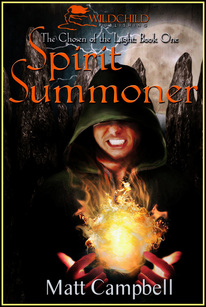 A long awaited moment is almost here. My book, Spirit Summoner, will begin shipping March 18th is paperback format. I've dreamed for countless years of seeing my work in print, and I'm happy to say that time is finally here! Thank you to all my friends and family who've supported me over the years, and especially, my readers old and new! Buy it today at Amazon and Barnes & Noble! |
Archives
March 2019
Categories |





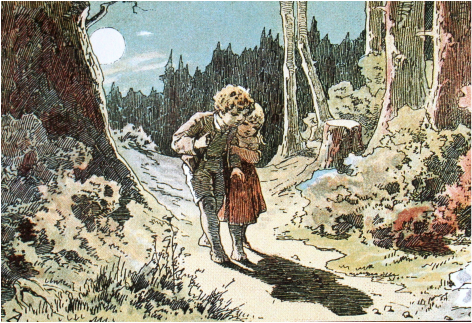

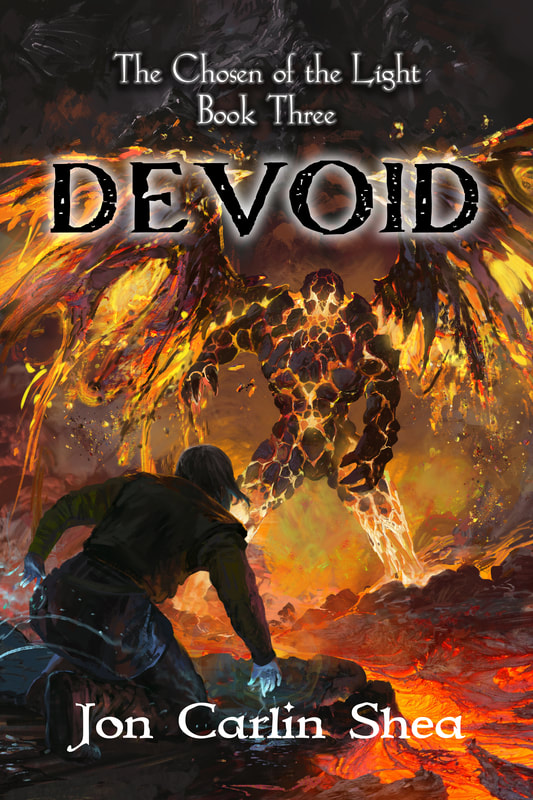

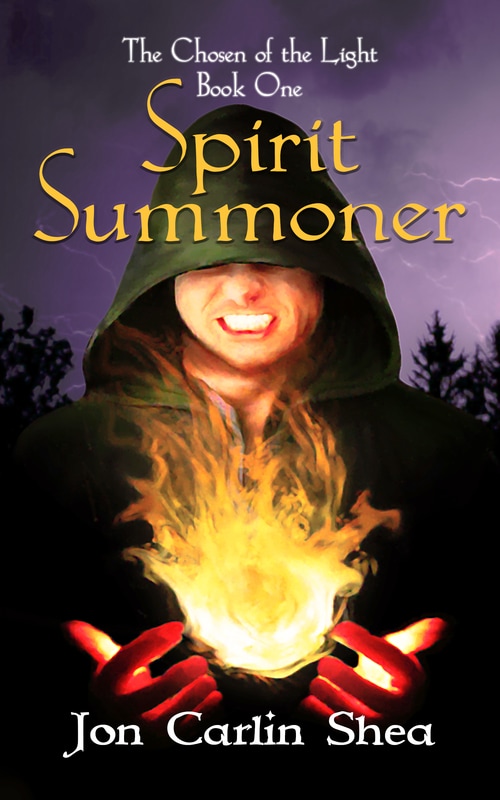
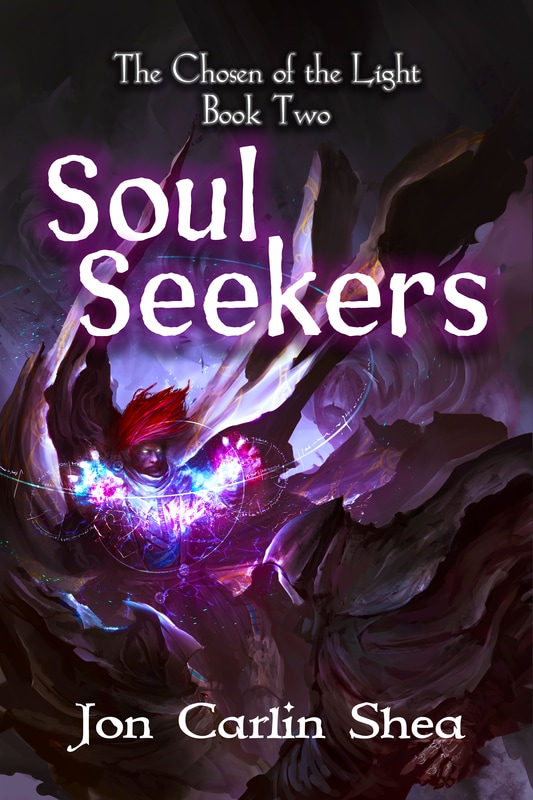
 RSS Feed
RSS Feed
